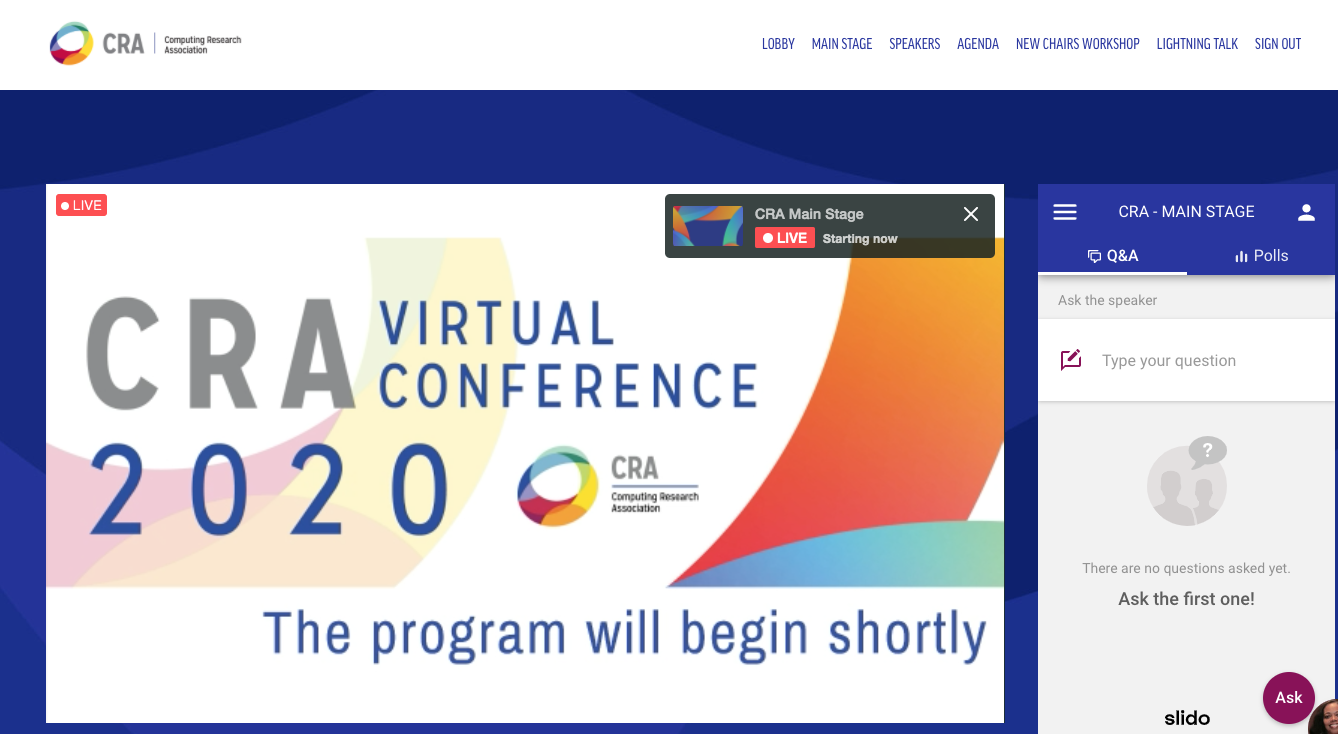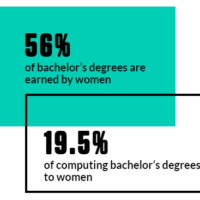Highlights from the CRA Virtual Conference 2020
 For nearly 50 years, the Computing Research Association (CRA) has brought the leadership of the computing research community together every other year at Snowbird, UT to discuss community issues. The COVID-19 pandemic interrupted our plans to hold an in-person event this year, just like it has disrupted much of our way of life, both professionally and personally. After canceling the in-person event, CRA quickly pivoted to provide the conference in an online format with specialized content addressing the current environment and challenges during these unprecedented times. CRA Board members Ran Libeskind-Hadas and James Allan stepped up as chair and co-chair of the Virtual Conference.
For nearly 50 years, the Computing Research Association (CRA) has brought the leadership of the computing research community together every other year at Snowbird, UT to discuss community issues. The COVID-19 pandemic interrupted our plans to hold an in-person event this year, just like it has disrupted much of our way of life, both professionally and personally. After canceling the in-person event, CRA quickly pivoted to provide the conference in an online format with specialized content addressing the current environment and challenges during these unprecedented times. CRA Board members Ran Libeskind-Hadas and James Allan stepped up as chair and co-chair of the Virtual Conference.
The event began with opening remarks from CRA Executive Director Andrew Bernat, CRA Board Chair Ellen Zegura, CRA Treasurer James Allan and CRA Secretary Ran-Libeskind-Hadas. Throughout each conference session, there were interactive opportunities for participants to contribute questions and comments. The conference videos are now available here and lightning talk videos are available here.
Opening Talks from National Science Foundation Leadership
Sethuraman Panchanathan, Director of the National Science Foundation and the first computer scientist to serve in this role, opened with an inspiring talk emphasizing the agency’s commitment to diversity. NSF CISE Assistant Director Margaret Martonosi described how NSF CISE is adapting to these unprecedented times with initiatives such as supporting the CRA/CCC CIFellows 2020 program, funding COVID inspired RAPIDs, offering REU flexibility, and transitioning to virtual review panels. She also detailed CISE’s broadening participation efforts and issues of security and ethics in computing.
Panel Sessions on Challenges During Unsettling Times
There were five panel sessions around this broad theme: teaching, research and collaboration, mentoring students and colleagues, challenges for chairs, and equity and systemic racism. Departments are all facing similar issues, including moving the academic unit’s educational and research activities online; dealing with faculty hiring and staffing constraints; and addressing budget shortfalls. Sessions provided a community forum to share best practices for continuing to navigate the unpredictable challenges imposed during the coronavirus pandemic and addressing community issues around race, equity, and equality.
Results of a Summer 2020 Survey of Computer Science Faculty and Academic Units
CRA conducted two surveys about the COVID-19 disruption in summer 2020. The first surveyed computer science faculty members who made the transition from teaching in-person to teaching online as the result of the COVID-19 pandemic. The survey asked faculty members about their perceptions of the challenges in moving to emergency online instruction and also about planning for the fall 2020 term. In early July, CRA surveyed the chairs of doctoral and non-doctoral departments. They were asked about the impact of COVID-19 so far on their faculty, department operations, student job searches, and budgets. They were also asked about their expectations and concerns for fall 2020. Both reports are available here. CRA Director of Statistics and Evaluation Betsy Bizot recently presented the survey results at the ACM Education Advisory Committee Meeting. Click here to view the clip of her presentation.
CRA’s Strategic Planning Effort
Last year, the CRA Board embarked on a process to develop a strategic plan to guide the organization into the future. At the conference, there were two interactive sessions to discuss from CRA members and CRA’s Strategic Planning initiative and gather feedback. This exercise to collect information occurred at a point when the plan has shape, yet room for constructive input regarding the priorities and essential factors for successful implementation of the emerging CRA Strategic Plan. CRA shared draft versions of the revised mission, priority outcomes, objectives, and initiatives that have been developed following extensive analysis and board input over the past year. The community feedback will be used to help determine what to focus on first and to identify key success factors.
The Changing Policy Landscape for Computing Research
The video presentation by Peter Harsha, CRA’s Director of Government Affairs, shed light on the current state of federal support for computing and science funding, plus CRA’s recent actions, all while giving a behind-the-scenes tour of CRA’s recently renovated office space. The first part of his talk covered more traditional areas for CRA — the state of federal funding for computing research and a review of some of the key pieces of legislation under consideration that could significantly alter federal investments in research and federal research agencies. In the second part, he discussed areas in which CRA Government Affairs is spending an increasing amount of effort: on government efforts to protect emerging technology, on the wide range of immigration restrictions proposed by the current Administration, on aspects of computing research and social justice, and the ubiquity of computing as a topic for policymakers and the challenges these all present.
Looking Forward
CRA values the community building that comes with the gathering of leadership and is moving forward with plans to hold a full in-person Conference at Snowbird August 3-5, 2021. CRA will resume the regular conference pattern of every other year, with a conference in 2022 and subsequent even-number years.
The CRA Virtual Conference 2020 was organized by Chair Ran Libeskind-Hadas (Harvey Mudd College) and Co-Chair James Allan (University of Massachusetts, Amherst). CRA would also like to thank the CRA Conference at Snowbird 2020 organizing committee, led by Jaime Teevan and Penny Rheingans, who worked hard to develop the original program. Thanks to everyone who contributed to making this year’s event a success!








